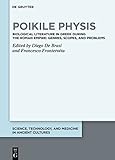Poikile Physis : Biological Literature in Greek during the Roman Empire: Genres, Scopes, and Problems / ed. by Diego De Brasi, Francesco Fronterotta.
Material type: TextSeries: Science, Technology, and Medicine in Ancient Cultures ; 12Publisher: Berlin ; Boston : De Gruyter, [2022]Copyright date: ©2022Description: 1 online resource (VI, 217 p.)Content type:
TextSeries: Science, Technology, and Medicine in Ancient Cultures ; 12Publisher: Berlin ; Boston : De Gruyter, [2022]Copyright date: ©2022Description: 1 online resource (VI, 217 p.)Content type: - 9783110796735
- 9783110796926
- 9783110796858
- 880.9 23/eng/20220930
- PA3015.S35 P64 2022
- online - DeGruyter
- Issued also in print.
| Item type | Current library | Call number | URL | Status | Notes | Barcode | |
|---|---|---|---|---|---|---|---|
 eBook
eBook
|
Biblioteca "Angelicum" Pont. Univ. S.Tommaso d'Aquino Nuvola online | online - DeGruyter (Browse shelf(Opens below)) | Online access | Not for loan (Accesso limitato) | Accesso per gli utenti autorizzati / Access for authorized users | (dgr)9783110796858 |
Frontmatter -- Contents -- Poikile Physis: A Short Introduction -- A Question of Breeding? Aelian, Aristotle, And Alexander In India (NA 8.1) -- Animal Exemplarity in Imperial Greek Prose -- “A Small Mirror of Greater and Nobler Enterprises” – Ants in Greek Imperial Literature -- Biology Between Scientific Education and Ethical Paraenesis: The Physiologus -- Biology and Theology: Zoological Systematics in Basil of Caesarea’s Hexaemeron -- Aelian’s Fabulous Trees -- Galen as Phytotomist – His Study on the Fruit of Citrus Medica L. -- A Hymn to Nature: Structure, Function, Design and Beauty in Galen’s Biology -- Biological Metaphor and Cosmology The Rejection of Plato’s Artificialism by the Middle Platonists and Plotinus -- Biology and Life in Plotinus’ Philosophy -- Notes on Contributors -- Index locorum -- Index rerum -- Index codicum
restricted access online access with authorization star
http://purl.org/coar/access_right/c_16ec
Biological literature of the Roman imperial period remains somehow ‘underestimated’. It is even quite difficult to speak of biological literature for this period at all: biology (apart from medicine) did not represent, indeed, a specific ‘subgenre’ of scientific literature. Nevertheless, writings as disparate as Philo of Alexandria’s Alexander, Plutarch’s De sollertia animalium or Bruta ratione uti, Aelian’s De Natura Animalium, Oppian’s Halieutika, Pseudo-Oppian’s Kynegetika, and Basil of Caeserea’s Homilies on the Creation engage with zoological, anatomic, or botanical questions. Poikile Physis examines how such writings appropriate, adapt, classify, re-elaborate and present biological knowledge which originated within the previous, mainly Aristotelian, tradition. It offers a holistic approach to these works by considering their reception of scientific material, their literary as well as rhetorical aspects, and their interaction with different socio-cultural conditions. The result of an interdisciplinary discussion among scholars of Greek studies, philosophy and history of science, the volume provides an initial analysis of forms and functions of biological literature in the imperial period.
Issued also in print.
Mode of access: Internet via World Wide Web.
In English.
Description based on online resource; title from PDF title page (publisher's Web site, viewed 29. Mai 2023)


